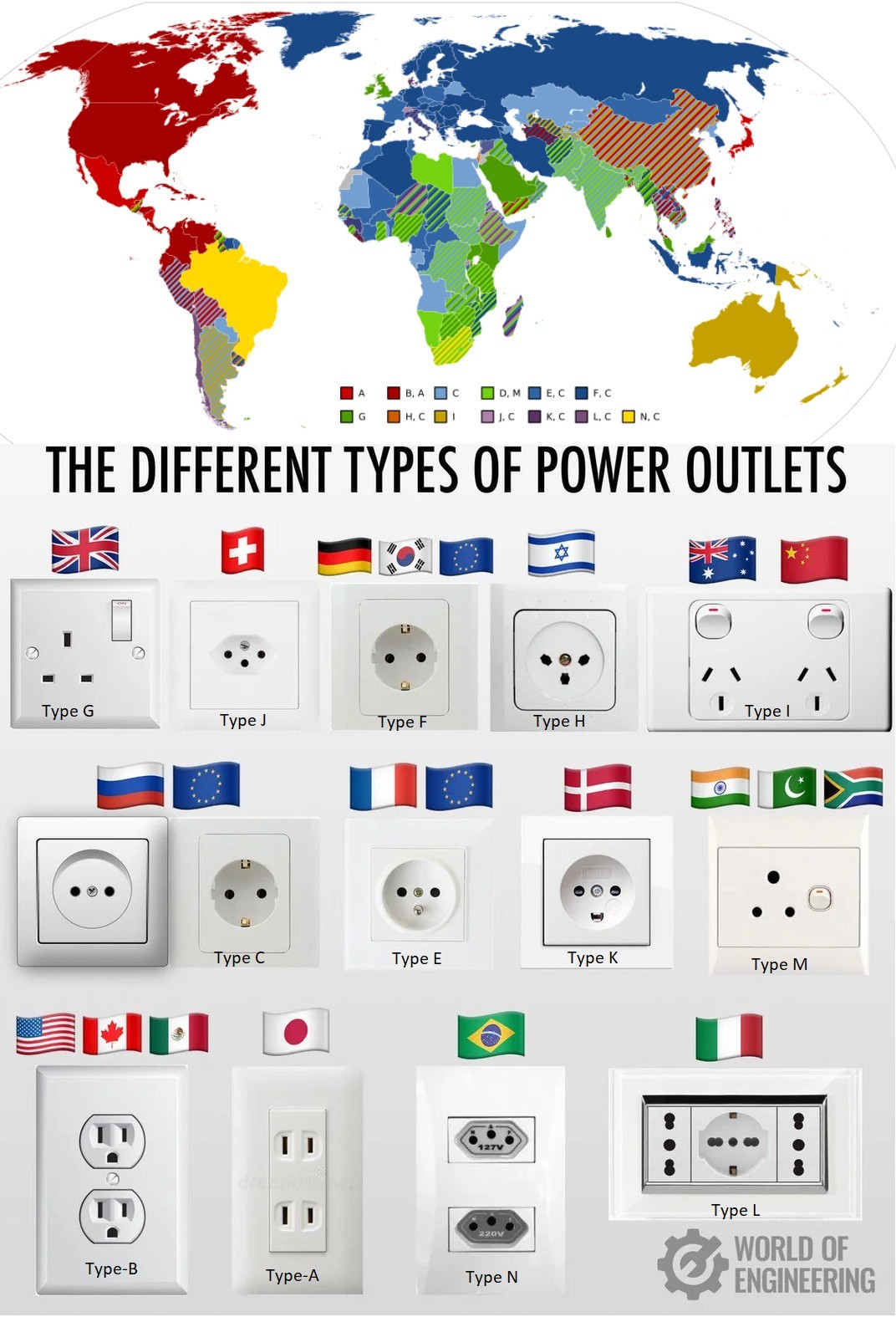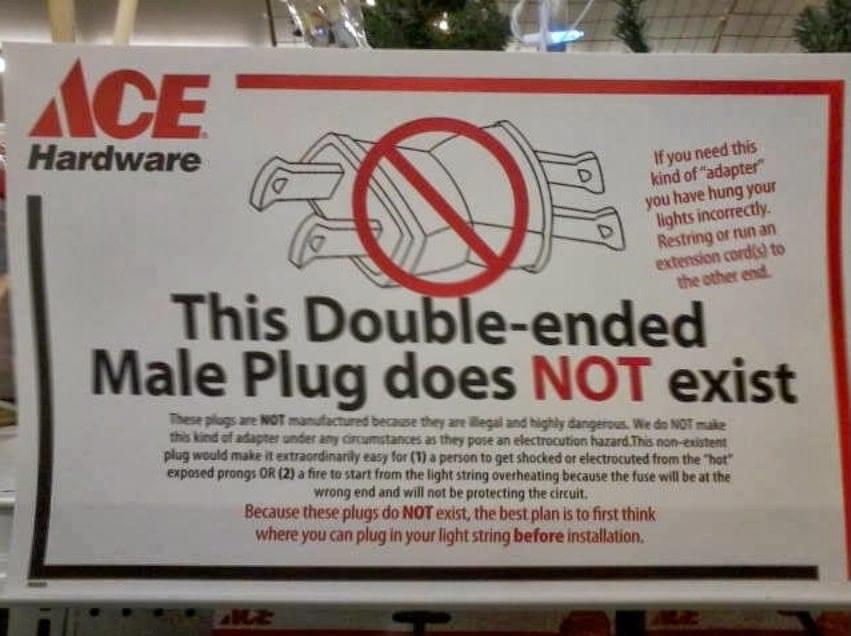What is the best Power Outlet, and why?
-
This is entirely an US problem created by the "center tap" nonsense. Nobody else I'm aware of uses that, let alone with that other. The outlet in question (type F) I'm only aware of being in use with one phase of a there phase supply plus the neutral, or just "the" phase and neutral. Note that in the second case, even if a house or apartment only has one phase wired to it, it's still generally part of a three phase supply, but the other phases just aren't wired to that particular place (incredibly rare these days, but might be the case for very old homes/installations).
Now the real reason for it being safe: The neutral is required to be wired to ground at the main breaker panel. With installations newer than 2000-something, every circuit has to be GFCI protected. With even newer installations having even more granular requirements (not sure on the specifics).
in many flats even recently built you don't get three-phase power, just single phase, but building divides single three-phase supply into three groups of single phase circuits like you say (do you really need 20kW in residential flat? one that doesn't use EV charger, built in 90s-10s?) i guess it depends on country also. separate houses tend to get three phase connection where i live
floating neutral will also be a problem in american-type two-phase installation, might be even worse (more frequent) on account of large number of lightly maintained transformers used (why on gods green earth there's few-kV medium voltage line going down every street, americans make it make sense)
-
The safest ones (design-wise) would be the ones that are inset, like types C, E, F, H, J, and K. If there is ever a chance a plug is partially pulled out or not fully inserted, the socket being inset wouldn't allow anything to touch any of the contacts.
Fuses in plugs and the orientation are relatively irrelevant to the plug style and are more a convention choice, if not regulatory requirement.
The British plug serves the same point as an inset because there's a bit of non-conductive material on the plug itself that goes into the wall. If it's not fully inserted then the only thing showing is the non-conductive material.
It also has the thickest metal on the plug as far as I know. It's probably the only thing that the British have ever engineered better than the Germans.
-
Don't a bunch of them, like I, have an earth pin?
You have an earth pin?
-
In my opinion it's Type-F
Because:
- It's bi-directional
- It's grounded and ungrounded plugs use the same socket
- It's already widespread (50+ countries) source
- Your fingers can't touch the live wire as you're plugging in a wire
- It's recessed
- Low footprint
- Accepts Type-C
Furthermore, appliances compatible with Type F are almost always compatible with Type E as well, it's just a matter of including both grounding mechanisms which they all do to avoid designing multiple cords.
I haven't yet visited the UK so the only time I've had trouble plugging in something in Europe is in shudders Italy.
-
A useful source:
https://worldofsockets.comG.
The plugs are shuttered, so they're protected from being stabby-stabbed. The plug's prongs are sheathed so live metal is never exposed, negating the need for recessed sockets. Compared to recessed plugs, it takes less force to insert/remove them, but the oversized prongs and their triangular arrangement means it can safely withstand more lateral stress than any other plugs. Every plug has a fuse appropriate to the appliance so every device has appropriate protection while also allowing any device to be used on any outlet - no need for dedicated outlets for tumble dryers. And the plugs are traditionally right-angled, so once they're plugged in they only protrude about a centimeter, making it easy to plug things in behind furniture.
The whole 'every plug has a switch' thing is bullshit, though. That's just weird.
-
In my opinion it's Type-F
Because:
- It's bi-directional
- It's grounded and ungrounded plugs use the same socket
- It's already widespread (50+ countries) source
- Your fingers can't touch the live wire as you're plugging in a wire
- It's recessed
- Low footprint
- Accepts Type-C
Hear me out, type L, the one in the middle, is the best socket, as it has all the things you talked about, but also accepts Italian plugs.
Type L bipasso (the one on the side) instead is the most space efficient, while retaining type C compatibility and grounding. Type L plugs also have plastic bits at the end to avoid contact with live wire (like UK one).
-
If there's electricity reaching the bulb it would be lit no?
So if I place the contact upside down, I wouldn't be able to turn off my light?It's not electricity, exactly, but it is a higher voltage that is different from the average of everything around it. Electricity needs a closed loop to flow, and breaking open the loop with a switch means that no electricity flows, but the voltage of the live line goes up and down, creating an electric potential with anything that might be at a different voltage, if a conductor touches both.
-
The Europlug is designed to be compatible with [Types C, E, F, and K]
Another sweeping win for Europ(e)lug!
-
I declare RJ45 and USB C everything! But for big boi power….. no clue.
Obviously you take a page out of gaming laptops books and just plug in more USB C cables for more power! You now need 4 USB C cables to power that toaster. And your stove? 12 of them should do!
-
Damn homophobes...
-
A useful source:
https://worldofsockets.comE, C and F, because they are all somewhat compatible.

-


Some images of the plugs, since I didn't know what they looked like.
It was mentioned the pins started being insulated like that second image 20 years ago, but going by the images I found the older uninsulated style is still more common. This is ofc a major shock hazard when plugging in your stuff.
Even with the insulation, you can still reach under the half inserted plug, just less easily and maybe only if you have smaller hands (like children).
Fundamentally flat sockets are doomed to be shock hazards, compare it to the recessed sockets where the entire surface the contacts insert into is cut off from reach before the pin insertion starts, and on top of that the pins of say type F have been insulated for so long many don't know there were uninsulated variants.
Another bonus of the recessed style is the plug doesn't stick as far out of your walls. For extension cords it's probably a bit bulkier, but when you sink the recession into the wallbox of the outlet you can get as flush as the width of the cable with an angled plug.

Also pretty sure you can step on angled type I plugs resting on their backs. The recessed plugs usually have grips on top so can't rest on their back even when angled. Their pins are also ball-shaped on the end, type I looks quite angular and more painful.
I live in Australia and I just did an audit of the power board that was sitting next to my bed. All four devices and the power board itself all have the insulated pins.
I can't remember the last time I saw one that didn't have insulated pins. I'm sure they exist, but they are not common.We also have RCD on all our circuits so if someone is able to short the pins, it will trip within 20ms or less.
-
And having your chargers look like clown shoes compared to the slender 2-pin chargers used in Europe, Australia and elsewhere is a small price to pay.
Do more kids really die of electrocution in, say, France or Germany than the UK?
Just jab a pen tip in the earth shutter, so you can push a European plug in, with little force. The diameters of the prongs are close.
-
And type B just realized how insecure it is.
You can make it a hell of a lot better just by installing it with the ground prong up.
But we won't even do that.
-
A useful source:
https://worldofsockets.comfuck's happenin in italy
-
Is this loss?
-
A useful source:
https://worldofsockets.comSchuko (Type F)
-
Schuko (Type F)
wrote on last edited by [email protected]Type G beats Schuko because if you put a Schuko adaptor on a UK plug, it will wreck Schuko sockets. That's what you get for leaving your earth connectors hanging out. They are no match for the mighty type G earth pin
-
G.
The plugs are shuttered, so they're protected from being stabby-stabbed. The plug's prongs are sheathed so live metal is never exposed, negating the need for recessed sockets. Compared to recessed plugs, it takes less force to insert/remove them, but the oversized prongs and their triangular arrangement means it can safely withstand more lateral stress than any other plugs. Every plug has a fuse appropriate to the appliance so every device has appropriate protection while also allowing any device to be used on any outlet - no need for dedicated outlets for tumble dryers. And the plugs are traditionally right-angled, so once they're plugged in they only protrude about a centimeter, making it easy to plug things in behind furniture.
The whole 'every plug has a switch' thing is bullshit, though. That's just weird.
The whole 'every plug has a switch' thing is bullshit, though.
There are way too many devices that will light up an led the moment you plug it in with no way to disable it.
-
A useful source:
https://worldofsockets.comItaly shakin'





